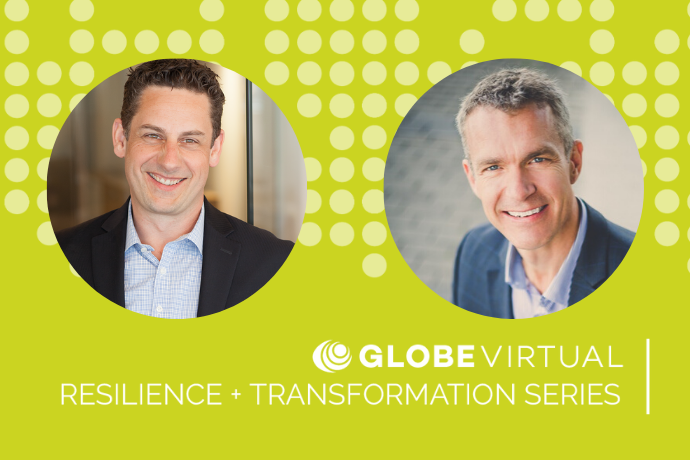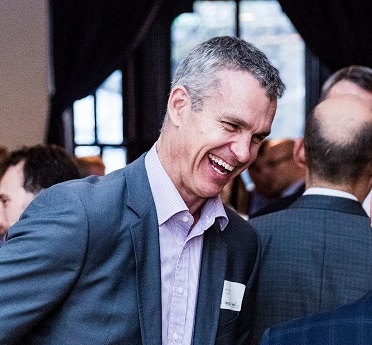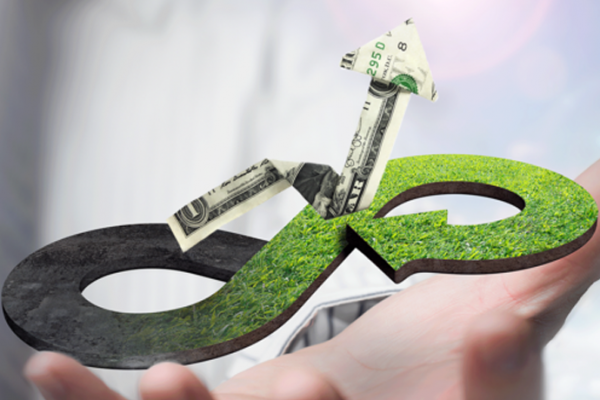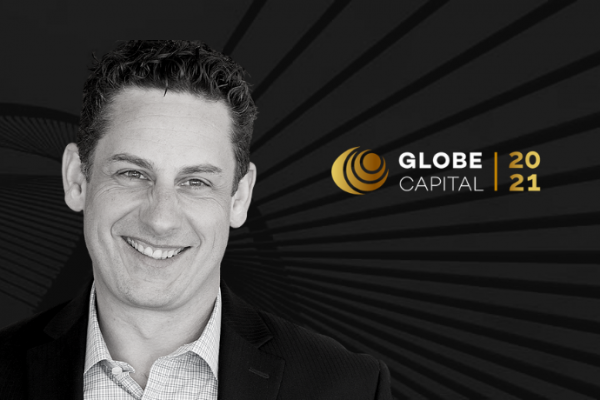Ahead of this week’s GLOBE Virtual webinar, How to Keep Your Sustainability Programming Alive in a Pandemic, we sat down (virtually) with Mike Gerbis, CEO of GLOBE Series and The Delphi Group, and Mike Rowlands, President and CEO of Junxion Strategy, for their insights on how to prioritize sustainability projects and positioning in light of COVID-19.
Can you describe the sustainability priorities within your own organizations, and how and if they have changed or evolved as a result of COVID-19?
Mike Rowlands: As a certified B Corp, we pay attention to our impact in five areas: the environment, our employees, customers and clients, community and governance.
Once the COVID-19 crisis hit, our staff were our top priority. We made it clear that we understood it wouldn’t be possible to maintain the same levels of productivity. We didn’t want our people feeling pressured to hit billable targets that were set pre-crisis, especially given the transition to working from home, juggling things like childcare, and the psychological burden our colleagues are suddenly carrying.
We also quickly got on the phone with our clients. The conversations were less about selling a product or service and more about offering our help if they needed it. It was about the spirit of partnership, being there for them in a time of need. As it happens, our strong relationships have served us well as projects have been extended and new business opportunities have emerged over the last few weeks.
In terms of community, a number of our clients are in social services and are working on the front lines of our most vulnerable communities. For example, they’re dealing with the awful challenge of how to respond to a dramatic increase in domestic abuse cases when they can’t do home visits. Knowing that they are at capacity, we’re trying to help by raising awareness and supporting them in any way we can.
Mike Gerbis: Our people have also been first and foremost in our minds. We communicate often and as transparently as possible, and we try to find the right balance between the need for optimism and hope with the need for realism and preparation. Authentic leadership is always important but it’s particularly important now; it’s okay to show your people that you’re human and vulnerable at a time like this. Showing that you care, that we’re all in this together, can help to build trust at a time when you need it more than ever.
We’re also adjusting our policies to provide more flexibility, so our people have the ability to look after their kids, go grocery shopping in the middle of the day, or just adjust their schedules the way they need to.
In terms of customers, like Junxion we are also reaching out and connecting with as many of them as we can. It’s not about the sell or the hard pitch but about building and strengthening relationships. We want to be there for them in any way we can.
When it comes to governance, at times like these, you really need clear direction and accountability—even more than you normally do. Staff aren’t around the proverbial water cooler right now, so we ensure they know what decisions have been made, what the decision-making processes are, and where and how they can make decisions on their own. Empowering staff to take the lead on certain things sends the important message that you trust them, and giving them agency and control is a great thing to do right now.
On the community front, we have given 1% of our gross sales to charity for years. We had the conversation about whether we should be doing that in 2020 in light of what is happening; the answer was a resounding yes. It’s an important part of who we are, and now is not the time to pull back from supporting our community, no matter the amount. We also offer our staff paid volunteering days, which some of our people have used to help out the food bank and other organizations that really need it right now.
You both run purpose-driven organizations, how important is your purpose in terms of navigating COVID?
MR: Our purpose is fundamental to how we respond to this crisis, and to our optimism in navigating through it. It shapes how we take action and how we behave during and after the crisis. Our purpose is to accelerate the shift to a new economy, which we believe can be ecologically regenerative.
MG: You’ll see people and organizations acting differently through the crisis. Competition will get stiffer as some leaders adopt a dog-eat-dog mentality, some organizations will make decisions based solely on the bottom line. However, if there’s one thing I’ve learned it’s that you have to stay true to your values or you lose your purpose and your way very quickly. Forgetting your values and failing to treat people with dignity and respect will backfire pretty quickly—internally if not externally. Now is the time to remember who you are and what you stand for, and to look for collaborative opportunities and partnerships. Focusing on values and relationships will hold you in good stead once we’re out of this crisis.
You have both led your organizations through economic downturns in the past. What are some lessons you’ve learned?
MR: Pacing is important. We had an ambitious agenda for 2020 and we won’t be able to do a bunch of things we were hoping to do. That’s disappointing, but the economy is cyclical and we’re being impacted by a global crisis. You need to have self-compassion as an organization, and to be pragmatic in the face of challenges. Junxion isn’t quite what it was going to be this year, but it will continue to move forward. There is more to do, we just can’t do all of it right now.
That said, we’re starting to turn our attention now to longer-term economic recovery and rebuilding efforts. That dialogue seems to be bifurcating: the emphasis is either on reverting back to extractive industries, some of which were already on the wane, or making bold investments in the green economy. What’s being forgotten in these conversations is the notion of a just transition, which is essential if we’re to avoid leaving vast swaths of society behind. We need the collaborative decision making and transparency we’ve seen during the crisis to persist after the crisis in order to make that kind of transition to a clean economy. This is a potentially powerful moment for dramatic change; we need to resist being opportunistic, of course, while focusing on the opportunity to rebuild for the better.
MG: Elizabeth Renzetti wrote a great piece in the Globe and Mail last week with the headline, “Nothing will be perfect again—and that’s just fine.” These are tough times and we are all going to have to make tough choices. We’re going to make mistakes. That’s ok—no guilt, no judgement, you do the best you can.
It’s hard to talk about silver linings when it feels like our world is imploding, but when we’re pushed to the precipice, we tend to be more creative and innovative—because we have to be. You just need to look around at how businesses are pivoting right now. You’ll see the sustainability community have similar ‘aha’ moments as a result of this crisis; the big ideas that are going to accelerate our transformation to a clean economy are coming.
What advice do you give to organizations that are struggling amidst the crisis, how should they prioritize their sustainability initiatives and decision-making?
MR: There is no divide between business and the communities in which they operate: businesses draw their labour and profit margins from the community. Wise leaders and smart brands are investing now in making their communities safer, and/or supporting local charities that help the more vulnerable in our towns and cities. When we hear people saying, “We’ll get through this together,” we think that needs to include businesses rolling up their sleeves to focus on issues that were perhaps aspirational when things were ‘normal.’
Smarter businesses will remember they’re part of our communities, too. As COVID-19 gives us all a new way to think about what sustainability means—including its social impacts—businesses can show up in a way people will remember. That can of course go two ways! But the brands that are good corporate citizens now will thrive in the long term.
MG: Be guided by your values and be sensitive to how people are feeling right now. If you run an ad that is tone deaf or you don’t address your customers’ concerns in the current environment, they’re not coming back. Think before you act and think about what people are going through when you’re making decisions—especially those that are in the business-to-consumer space. You sometimes see privilege and entitlement creep into people’s attitudes during a crisis, but COVID doesn’t care who you are. None of us is immune.
MR: I agree with that. With great power comes great responsibility and, since privilege is power, so with great privilege comes responsibility. If you’re well off, don’t allow yourself to be walled off. Use your privilege to help those who don’t have access to power, capacity, or resources. Ask yourself and your organization, “Where can we use our expertise to help?” It doesn’t have to be working on health-related issues; there are many ways to make a difference right now.
Do you think COVID will lead to the reshaping of corporate sustainability, or the corporate sustainability agenda?
MG: Companies and financiers are still demanding climate- and sustainability-related action and disclosure. The COVID crisis has underlined the interdependence of health, social, economic and environmental issues, and the importance of a collective response to a global crisis. I think the corporate sustainability agenda is only going to get stronger and more compelling.
MR: There is going to be strong pressure to go back to normal, but the purpose revolution—which stands on the back of the sustainability movement—is in many ways unstoppable. I believe that the generational transition we’ve been talking about for years has been brought into stark view because of the COVID crisis. If you think that transition will halt because the economy is on pause and its fragility has been exposed…I’d say to you, “no way”. We just need to make sure we don’t vilify the people in the fossil fuel industry and others; they need to be part of a just transition.
MG: We need to have conversations and we need to find common ground so that our vision of a sustainable future is inclusive.
MR: I’ve been impressed with how federal political leaders have conducted themselves through this. For years, the press called the second party the “opposition” party. It should be the loyal opposition, in service of better ideas, working with government on the best ideas for our country. When we’re in a push comes to shove moment, in a profound health and economic crisis, they are the loyal opposition again. I hope this continues, and that industry and other sectors see that there is a different way to work together. A better way to work together.
Are there opportunities to build a better, more sustainable future as we come out of this?
MG: There is tremendous opportunity. I have no doubt that we’ll come out of this crisis and recognize how important small gestures and individual actions are. We have a huge opportunity right now to make massive investments that not only kickstart the economy, but also set us on the path towards a more sustainable, socially just future. Investing in more sustainable and resilient infrastructure, energy efficiency retrofits in all building stock from commercial units to affordable housing, renewable energy, etc., will create jobs and opportunities for generations. Those who are most privileged have an important role to play in this transition; they can help shape business’ fundamental role away from generating profits for shareholders and towards building an interconnected community.
MR: It’s heartbreaking to walk through our neighborhoods right now, with so many small businesses boarded up and closed. In the last 24 hours, I’ve heard about two beloved, long-serving community businesses that will not be re-opening after all this. They’re local employers that hire local people, including young people and students, who are finding it harder and harder to find their first jobs. After all this, as part of our national recovery efforts, I’d love to see a re-localization of economics. LOCO BC just updated a study looking at the multiplier effect of dollars spent with local businesses. Those monies get recirculated through the economy many times more than those that are spent with big businesses that often are headquartered overseas. We’re witnessing now the fragility of our corporate, centralized economy. Local models are more resilient.
Any final words of advice?
MR: When we go through huge crises like this one, it’s natural to think that the solutions for macro-level problems are also at the macro level. “It’s up to government.” But in reality, we’re already hearing about industry associations—retail, hospitality, tourism, and many others—doing the work to help their sectors to recover. And each of us who lead organizations can use our purchasing power, our influence, and our products and services to serve a healthy recovery. And of course, each of us as people can continue the amazing things we’re all doing in our neighborhoods, and with our colleagues and friends. We’ve all been reminded through this that each of us is responsible for the communities we live in. Let’s not forget this as we settle into ‘a new normal.’
MG: Don’t forget to take care of yourself—put the oxygen mask on first. You can’t support your staff, your family, friends or neighbours through this if you’re not taking care of yourself physically, mentally, spiritually. Stay safe. Be compassionate. Stay positive.
Continue the conversation with our next GLOBE Virtual Webinar: How to Keep Your Sustainability Programming Alive During a Pandemic on April 23, 10 a.m. – 11 a.m. PT, 1 p.m. – 2 p.m. ET.




